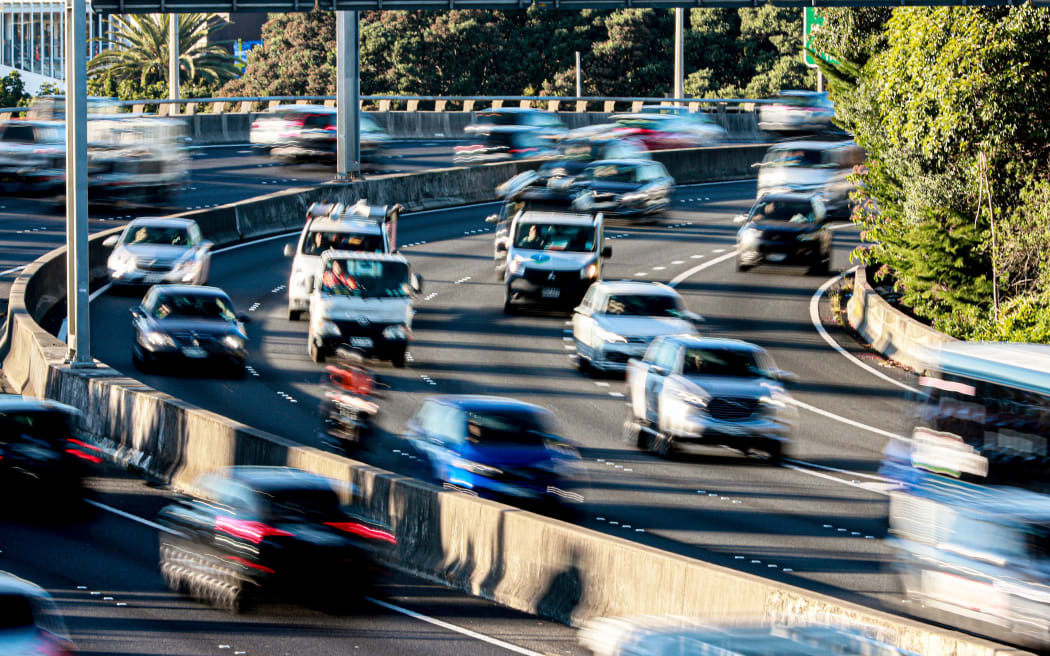
Currently, New Zealanders pay a petrol excise duty of 70 cents per litre, and drivers of heavy freight, diesel or electric vehicles pay a road user charge determined by vehicle type and weight (file photo). Photo: RNZ / Marika Khabazi
A user-pays model could fix New Zealand's chronic potholes and congestion, a public policy think tank suggests in new report.
The New Zealand Initiative report, titled Driving Change: How road pricing can improve our roads, proposes a "smart" road user charges (RUC) system, where drivers pay rates depending on what vehicle they drive, how far they travel and when. It also proposes adding congestion charging to the mix.
Report author Dr Matthew Birchall said transport funding needed reform to sustain the maintenance and growth that roads needed.
Currently, New Zealanders pay a petrol excise duty of 70 cents per litre, and drivers of heavy freight, diesel or electric vehicles pay a road user charge determined by vehicle type and weight.
Dr Birchall said this was regressive and outdated.
"When we pay fuel tax, people on lower incomes typically drive less fuel efficient cars, so they're actually paying proportionally more for each kilometre travelled. This [Smart RUC] can be a fairer way."
A combination of congestion, or 'time of use' charges, and road user charges, would help manage traffic more efficiently, he said.
The report sets out a five-year plan for overhauling the road pricing system, and congestion charges would come in at the final year.
Many cities overseas, such as Stockholm or Singapore, already have congestion charges, but a nationwide user-pays system would be a world first.
"I think Kiwis see the state of our roads - whether it's congestion or potholes - and think we need a better way," Dr Birchall.

Photo: RNZ / Marika Khabazi
Ia Ara Aotearoa Transporting New Zealand policy and advocacy lead Billy Clemens said the freight industry would welcome a user-pays system, and that petrol tax was not sustainable.
"There's a real pressure on transport revenue, and if we want to see the modern roading that we need and upgrades to our infrastructure, we need to look at innovative new methods of how we can raise revenue and also reduce congestion through our network."
He believed a Smart RUC system would deal with congestion clogging up roads and allow freight to move more efficiently.
"We know our road freight members operating in Auckland, Tauranga, Wellington and down in Christchurch, it's taking them longer and longer to get around. And unfortunately, when freight isn't moving effectively, that ends up costing consumers and businesses all over the country."
But others are concerned New Zealand's public transport is not ready to handle the potential increase in commuters trying to avoid congestion charging.
Automobile Association policy director Martin Glynn agreed Smart RUC could be a more sustainable funding model for infrastructure, but said it would mean come at a cost for some drivers.
"Our concern is particularly with lower income households, who often need to drive at peak times like the rest of us to get to work or to get to education, they often don't have good public transport options.
"Both in Auckland and Wellington, our public transport tends to be orientated towards the central city and used by office workers."
It was hard to know exactly how much more, or less, drivers would be paying under the Smart RUC plan, Glynn said.
"The inference that I take from that, is that charges would need to be a lot higher, in other words motorists should pay a lot more to get the system that we want, and I think ultimately it comes down to how much people can afford and are willing to pay."
A user pays model would be hard to implement, but it might help solve the crisis of underfunding for New Zealand's transport infrastructure, he said.







